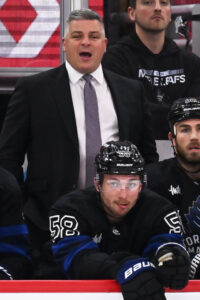The Toronto Maple Leafs’ season ended last night, with the team eliminated five games into the second round thanks to an overtime goal from Florida Panthers forward Nick Cousins. Their elimination from Stanley Cup contention begins what is likely to be a franchise-defining offseason.
General manager Kyle Dubas is on an expiring contract, while “core four” franchise faces such as Auston Matthews, Mitch Marner, and William Nylander are eligible to receive contract extensions this summer. Those players will also see the trade restrictions tighten on their existing contracts, with Matthews and Marner receiving full no-move clauses on July 1st, while Nylander receives a 10-team no-trade list at the same time.
While past playoff disappointments did not catalyze any major organizational changes, it seems this offseason could be different. The Athletic’s James Mirtle shed some light on the challenges Toronto faces heading into their offseason, reporting that keeping Toronto’s front office together “will be far more complicated than simply coming up with a modest extension offer” for Dubas. (subscription link)
According to Mirtle, Dubas “will want to be paid handsomely,” especially if there are offers from competing franchises. Mirtle also writes that Dubas “will want greater job security and autonomy within whatever structure Maple Leaf Sports & Entertainment settles on” for the future of the organization. It’s fair to wonder whether the Maple Leafs’ top decision-makers are ready to make that sort of commitment to Dubas after this disappointing playoff loss.
Tied to Dubas for the vast majority of his coaching career, Maple Leafs head coach Sheldon Keefe’s future is similarly up in the air. Mirtle reports that if the Maple Leafs do end up with a new general manager, “it’s hard to see [Keefe] retained, after four consecutive playoff losses.” But even if Dubas remains in place, Mirtle reports that “there will be a lot of pressure to make a change” behind the bench, especially given some of the high-profile names currently available to be hired as a team’s new head coach.
The reasoning behind Keefe’s departure seems to stem largely from his failure to win more than one playoff series at the helm of some extremely talented Maple Leafs teams. This is likely due to the fact that excluding the postseason, Keefe’s body of work behind the bench in Toronto has been stellar.
He originally rose to the role of head coach after the firing of Mike Babcock, when Toronto was in a relatively tenuous place. He immediately stabilized the Maple Leafs’ season and guided them to a 27-15-5 record in his first campaign behind the bench.
But that regular-season success would go largely forgotten as Toronto fell in the qualifying-round series to the Columbus Blue Jackets, a loss that would serve as a sign of things to come.
Keefe went 35-14-7 the following season but saw his team blow a 3-1 series lead to their arch-rivals, the Montreal Canadiens, in the first round of the playoffs. Over the past two years following that series, Keefe has amassed a 104-42-18 record, and his sterling track record of regular-season success is certainly not easily dismissed given how difficult consistent contention in the NHL can be. But Maple Leafs fans surely expected more from this star-studded era, and Keefe’s teams have failed to provide much of anything after the conclusion of the regular season.
It’s a similar story for Dubas, who has made quite a few excellent moves and rightfully earned a reputation as one of the league’s better general managers over the course of his tenure in Toronto. He has made several moves that have paid off wonderfully, such as the team’s buy-low acquisitions of Jack Campbell, Michael Bunting, Ilya Samsonov, and to a lesser extent Conor Timmins. But some larger bets have backfired. Both Matt Murray and Petr Mrazek proved to be salary cap anchors rather than saviors in the crease, while some trades have not aged as well as the team might have hoped, such as deals that sent away players such as Nazem Kadri, Mason Marchment, or Alexander Barabanov.
So, like anyone else who has ever been in charge of team-building for an NHL franchise, Dubas has made his fair share of mistakes. But are his mistakes, which have been largely outnumbered by shrewd moves, enough to punch his ticket out of Toronto? Or will any Dubas departure instead be more related to the inescapable reality that his plethora of savvy moves has not yet resulted in any sort of sustained playoff success?
This is the dilemma that the Maple Leafs face right now. They will have to navigate internal and/or external demands to make a change after such a disappointing string of early playoff exits with an understanding that there aren’t a whole lot of general managers who have won as consistently as Dubas, or head coaches with as many wins as Keefe.
As Mirtle indicates in his reporting, “ownership pressure” in Toronto “is sure to dial up to a new level, perhaps to the point they’re demanding substantive change rather than merely suggesting it,” as they may have in the past. So understanding that, could the first major change that gets made by Toronto be of the off-ice variety?
Photos courtesy of USA Today Sports Images